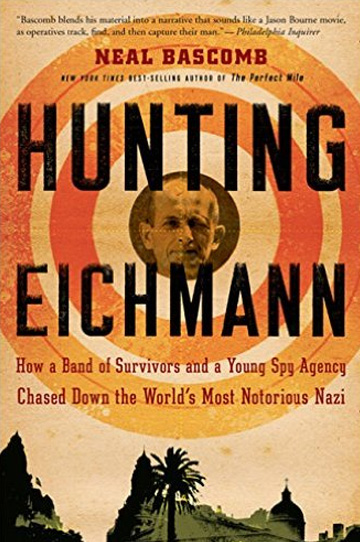
Hunting Eichmann
April 1, 2009 | San Francisco Chronicle
How a Band of Survivors and a Young Spy Agency Chased Down the World’s Most Notorious Nazi
Never underestimate the stupidity of criminals. Even war criminals. After Adolf Eichmann, the bureaucratic overseer of the Final Solution, escaped from Europe after World War II, he settled down in a Buenos Aires neighborhood that was known to harbor other fugitive Nazis. He eventually sent for his wife and sons – whom Israeli agents had been watching closely – and, unwilling to drop the patrimonial baton, insisted that the boys continue using his last name.
In the pre-wired 1950s, it still took the Mossad more than a decade to find Eichmann, but for a man on the run, these blunders were the equivalent of a burglar making a few phone calls and dropping his billfold on his way out of the house.
Neal Bascomb tells the story of Eichmann’s years in hiding and Israel’s persistent effort to catch up to him in “Hunting Eichmann,” a nonfiction account that reads like a Tom Clancy thriller. Bascomb made several discoveries, unearthing Eichmann’s passport and detailing the mood and the happenings aboard the secretly outfitted El Al flight that spirited Eichmann from Argentina to Israel for trial and, eventually, execution.
But the point of a book like this isn’t to break new ground; it’s to see who can tell the story best. Given that this one has been told and retold before, including versions by many of the Mossad agents involved in the mission, Bascomb has set himself an ambitious task.
The book’s best moments are actually the quiet ones. The author movingly portrays a Mossad operative who, as he guarded Eichmann in the interminable days between abduction and flight, found himself absentmindedly sketching pictures of his sister, lost in the Holocaust, and of his parents, “side by side, hands touching.”
Bascomb very ably describes the stunned scene in the Knesset after Prime Minister David Ben-Gurion announced Eichmann’s capture to the world, as well as the way the indomitable Golda Meir clutched her breast and nearly fainted when she was privately informed. And if Bascomb’s Eichmann is not quite the nuanced conundrum that Hannah Arendt sketched in “Eichmann in Jerusalem,” the author is nevertheless quite good on the way the captive’s piteous helplessness – his trembling hands, his quick capitulation – perplexed and disgusted his captors.
But “Hunting Eichmann” too liberally uses those slippery handrails that these days keep narrative nonfiction from limping along too slowly for the reading public: little dramatic cues we instantly recognize from the movies that tell us what to think. “Thunder cracked in the distance, warning of a storm,” just before the team apprehended Eichmann on his walk home from the bus station. “Cigar smoke plumed out” of the window of “[a] black sedan [that] pulled to the curb,” when a spy approached another for a rendezvous. One is grateful that Bascomb does not have a solitary dove circling on high after the noose stretches Eichmann’s neck.
These are the type of cliches that any writer might have taken extra pains to avoid in a book about a man whom Arendt famously found so banal, contradictory and unexceptional as to be “genuinely incapable of uttering a single sentence that was not a cliche.”
Cliches aside, Bascomb tells Eichmann’s story faithfully, even, to his credit, when the story is rather mundane. No explosions or passionate kisses are added. Here are 10 pages on the search to find a suitable safe house; here are 10 on whether the El Al plane will have enough fuel for the long journey to Israel. Good, clean spy worries – which are riveting. Nothing more is needed to sell a story this good.